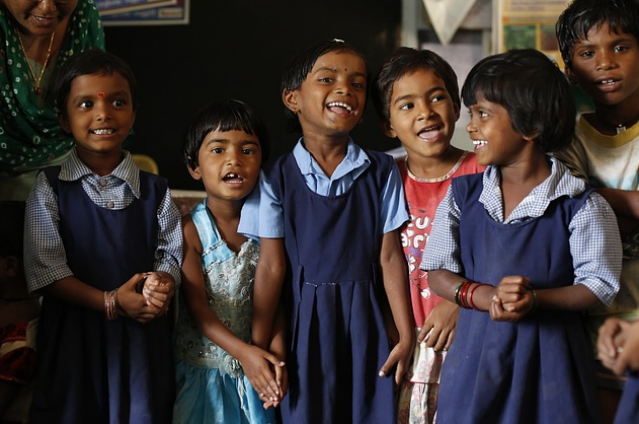
Image by AkshayaPatra Foundation from Pixabay
Introduction
Education, often referred to as the bedrock of societal progress, plays a pivotal role in shaping a nation's destiny. In the case of India, a diverse and dynamic nation of over 1.4 billion people, the National Education Policy (NEP) 2020 has emerged as a transformative beacon. This policy, introduced in July 2020, not only seeks to renovate but revolutionize the country's educational framework. This article embarks on a profound journey, scrutinizing the multi-dimensional facets of NEP 2020, encompassing its historical origins, key components, prospective ramifications, looming challenges, and the uncharted path ahead.
A Historical Perspective
- The Evolution of Education in India
The quest for excellence in Indian education did not commence with NEP 2020; it has been a continuous endeavor since independence. This section meticulously traces the evolution of India's education system, showcasing the pivotal milestones that paved the way for the need for a comprehensive policy overhaul.
The Genesis of NEP 2020
- Catalyzing Change: Imperatives and Catalysts
In an era of global dynamics and rapid technological advancements, India found itself at a crossroads. Explore the multifaceted factors that served as catalysts for NEP 2020, including the digital divide, skill gap, and global competitiveness.
- Visionary Foundations: Pillars of NEP
NEP 2020 is built upon a sturdy foundation grounded in visionary principles. Unearth the core pillars of the policy: Access, Equity, Quality, Affordability, and Accountability, each meticulously designed to propel India towards educational excellence.
Key Components of NEP 2020
- Architecting the Future: The 5+3+3+4 System
NEP 2020 envisions a structural reformation in education. Delve into the intricacies of the novel 5+3+3+4 system, delineating its stages and elucidating how it caters to the diverse developmental needs of learners.
- Lingual Diversity: Multilingualism in Education
Language is the bedrock of communication and comprehension. NEP 2020 advocates for multilingualism, placing mother tongues at the forefront of learning. Understand the policy's approach to language diversity and the significant role it plays in holistic education.
- Empowering Learners: Flexibility and Choice
NEP 2020 empowers students to choose their educational trajectories, blurring the demarcations between arts, sciences, and vocational streams. Explore the flexibility and choice mechanisms and how they equip students for the modern world.
- Elevating Pedagogy: Quality Enhancement
Quality education hinges on proficient pedagogy. Discover how NEP 2020 aims to enhance educational quality, fostering experiential learning, critical thinking, and professional development for educators.
- Higher Education Reinvented: The HECI Era
The landscape of higher education in India is set for a transformation with the establishment of the Higher Education Commission of India (HECI). Unravel the intricacies of this pivotal development and its far-reaching implications.
- Learning Without Borders: Global Collaboration
NEP 2020 embraces internationalization. Investigate the provisions for global collaborations, faculty exchanges, and the establishment of Indian campuses by top world universities, ushering India into the global education arena.
Potential Impact of NEP 2020
- Nurturing Holistic Individuals: Early Childhood and Experiential Learning
NEP 2020 places a strong emphasis on early childhood education and experiential learning, fostering holistic development. Delve into how these facets prepare students to be well-rounded individuals.
- Bridging Disparities: Education for All
NEP 2020 aspires to bridge the gap in educational access, promoting inclusive education for all, irrespective of socio-economic background. Explore the policies and measures aimed at achieving this lofty goal.
- India as a Knowledge Hub: Research and Innovation
NEP 2020 is not just about disseminating knowledge; it's about creating it. Understand how the policy encourages research, innovation, and knowledge creation, positioning India as a global knowledge powerhouse.
- Beyond Academics: Employability and Skill Development
NEP 2020 goes beyond academics, focusing on employability through vocational education and skill development. Examine the policies designed to ensure graduates are job-ready in a competitive world.
Challenges and the Road Ahead
- Monumental Implementation: Scaling Up Infrastructure and Capacity
The successful implementation of NEP 2020 on a massive scale poses monumental challenges. Explore the intricacies of developing infrastructure, teacher training, and securing funding to turn this policy into reality.
- Transition Period: Adaptation and Acceptance
Change, even when necessary, is met with resistance. Understand the challenges faced during the transition period as stakeholders adapt to the new educational structure, curricula, and teaching methodologies.
Conclusion
In conclusion, the National Education Policy 2020 embarks on an audacious journey to reshape India's educational landscape. It envisions an adaptive, learner-centric system that equips students with the skills needed to thrive in an ever-evolving world. As India treads this uncharted path, the effective execution of NEP 2020 stands as the linchpin for realizing the grand vision of becoming a global knowledge superpower.
